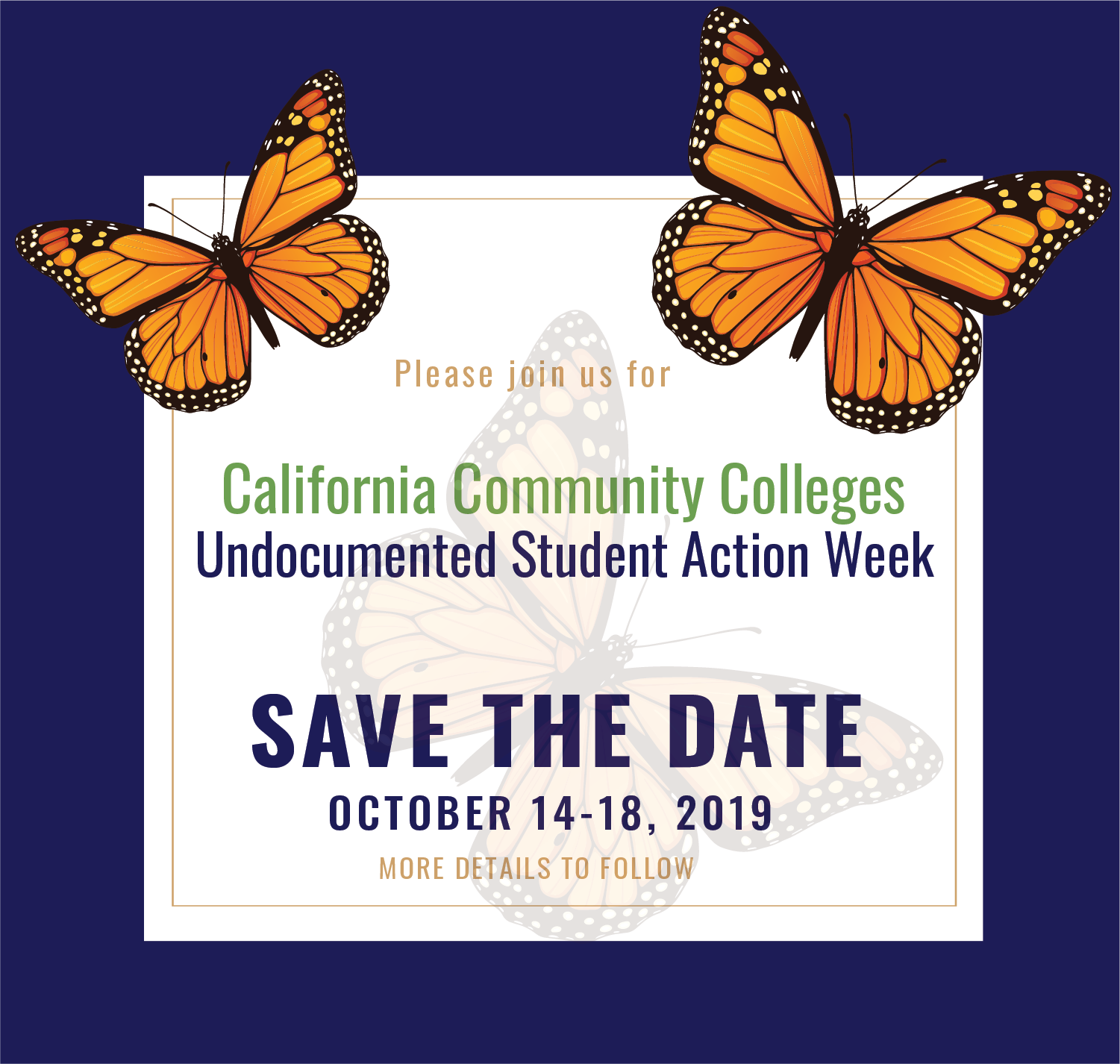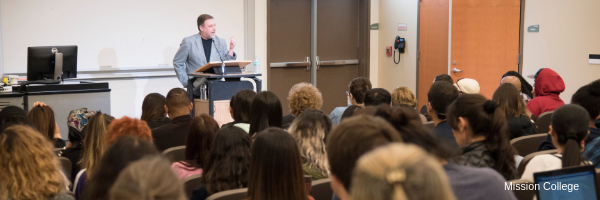In this Issue:
- Congressman Adam Schiff Introduces Food for Thought Act to Address Food Insecurity on Community College Campuses
- Thank Legislators for Supporting the Release of Prop 51 Bond Resources
- Legislative Update
- Department of Education Issues Final Repeal of Gainful Employment Rules
- SAVE THE DATE: Undocumented Student Action Week
- Federal Grant Opportunities
- Upcoming Events

Congressman Adam Schiff Introduces Food for Thought Act to Address Food Insecurity on Community College Campuses
The Community College League of California and the Affordability, Food & Housing Access Taskforce have joined Congressman Adam Schiff (D-CA) in co-sponsoring the Food for Thought Act H.R. 4065, a bill to establish a meal program to address food insecurity on community college campuses across the country.
Introduced on Thursday, July 25, the Food for Thought Act, would create a demonstration program to make grants available to community colleges so they can provide free meals to food-insecure students. The program would be administered by the Food and Nutrition Service (FNS) within the United States Department of Agriculture. For the full press release, click here.
“The Affordability, Food & Housing Access Taskforce has been successful in garnering the attention of state and federal policymakers to the prevalence of food and housing insecurity among California Community College (CCC) students. Led by Co-Chairs Dr. Pamela Luster of San Diego Mesa College and Dr. Keith Curry of Compton College, the 17-member Taskforce of CCC CEOs and Trustees has been working with prominent researchers and state and federal policymakers to enhance understanding and awareness of these critical issues, and to identify approaches to support students confronting basic needs insecurities. Congressman Adam Schiff’s Food for Thought Act recognizes and incorporates the important work of the Affordability, Food & Housing Access Taskforce and is an essential component of the ongoing work to support struggling students as they pursue their higher education goals for themselves and their families,” said Community College League of California President & CEO Larry Galizio.
If your college or district is interested in co-sponsoring this bill, sign up below.
Co-Sponsor the Food for Thought Act

Thank Legislators for Supporting the Release of Prop 51 Bond Resources
Thanks to persistent messaging and over a dozen advocacy days with community college district leaders from throughout California to demonstrate the urgent need and value of college facilities, Governor Gavin Newsom and the State Legislature approved funding for all projects in the 2019-20 Capital Outlay Plan. The 2019 Budget Act includes $535.3 million in capital outlay funding from Proposition 51, a measure approved by California voters in 2016. The funding will support 20 continuing projects and 39 new projects.
Join the Community College League of California in thanking the Governor and Legislature for honoring the will of voters and funding the backlog of community college capital outlay projects. Please use the following form to thank your state representative.
Join Us and Take Action Today!

Legislative Update
On July 11th, the State Legislature began a month-long Summer Recess. Upon return on Monday, August 12, 2019, the Legislature will only have three weeks for bills to clear the Appropriations Committees. The majority of the bills going through the Appropriations Committees were placed on the Suspense File, where legislation that has a fiscal impact above a certain threshold is placed so all the measures can be considered together in the context of the state’s financial resources. The Appropriations Committee is expected to consider measures on the Suspense File on Thursday, August 29, 2019, at which point they will announce whether bills will move forward for a full floor vote or be held in the Committee.
Below are bills the League is tracking and their current status.
AB 30 (Holden) Community Colleges: College and Career Access Pathways
Would encourage greater community college participation in the College and Career Access Pathways (CCAP) partnership program, established by AB 288 (Holden) of 2015, by reducing the administrative challenges related to program implementation. It also requires the Chancellor’s Office to prepare a CCAP summary report every 5 years.
Pending in the Senate Appropriations Committee.
AB 48 (O’Donnell) Education Finance: School Facilities: Kindergarten Community Colleges Public Education Facilities Bond Acts of 2020 and 2022
This bill would put K-14 school facilities bonds on the 2020 and 2022 ballots. The bill would include certain preschool facilities, add a matching requirement for the lead program, and set the 2020 bond amount at $13 billion (2022 bond amount still unspecified). The bill would require the Board of Governors of the California Community Colleges to review and evaluate applications for capital outlay allocations of funds made available for community college facilities. The bill would also require the Board of Governors to prepare an annual capital outlay spending plan for recommended expenditures of funds pursuant to those bond acts.
Pending in the Senate Appropriations Committee.
AB 302 (Berman) Community Colleges Overnight Parking
This bill would require a community college campus that has parking facilities on campus to grant overnight access to those facilities to any homeless student who is enrolled in at least 6 units of coursework and is in good standing with the community college. The bill would require the governing board of the community college district to determine a plan of action to implement this requirement. Colleges can opt-out of the overnight parking facilities if they provide ALL of the following housing services:
- Emergency grants that are necessary to secure or prevent the imminent loss of housing
- Hotel vouchers through a public agency or community organization
- Rapid rehousing referral services
Additionally, the bill would also require a housing assistance tab to be clearly visible and easily accessible from a drop-down menu on the community college’s home page.
The bill’s recent amendments would also require a community college district to:
- Provide a form to the participating students that clearly and conspicuously indicates that the community college district cannot ensure the safety of a student who participates in overnight parking
- Establish overnight parking rules that participating students must follow, including a zero-tolerance policy for use of drugs or alcohol
- Establish a procedure for registering and verifying the identity of eligible students and their vehicles
- Establish a procedure for identifying participating students who have engaged in behaviors that pose a substantial threat to the physical safety of other participating students and, as necessary, warning such students to correct their behavior or revoking their eligibility to participate in overnight parking
- Develop a document that clearly and concisely describes the rules and procedures established and provide this document to the participating students
The amendments also stipulate that community college districts that comply with the bill’s requirements are not civilly liable for a district employee’s good faith act or omission that fails to prevent an injury to a participating student that occurs during the hours and operation of overnight parking. This immunity; however, does not apply to negligence, intentional misconduct, or violations of other provisions of law. The bill would remain in effect until December 2022.
Pending in the Senate Appropriations Committee.
AB 540 (Limón) Service Incentive Grant Program
Would create the Service Incentive Grant Program, commencing with the 2020–21 academic year, under the administration of the California Student Aid Commission for community or volunteer service to community college students who qualify for the exemption from nonresident tuition established by AB 540 (Firebaugh, Chapter 814, Statutes of 2001).
Pending in the Senate Appropriations Committee.
AB 595 (Medina) Community Colleges: Apprenticeship Programs
Would authorize a student enrolled in a community college class or classes pursuant to an apprenticeship program or an internship program, who does not have a social security number to use as an individual tax identification number for purposes of any background check required by the class or program.
Pending on the Senate Floor.
AB 612 (Weber) CalFresh: Restaurant Meals Program
Would allow the California Department of Social Services to enter into a memorandum of understanding with California Community Colleges Chancellor’s Office in order to enable qualifying food facilities located on the campus to participate in the Restaurant Meals Program.
Pending in the Senate Appropriations Committee.
AB 695 (Medina) Authority to Use Design Build Contracts
The law authorizing California Community College districts to use design build contracts is set to expire on January 1, 2020. AB 695 extends the authorization for community college districts to enter into design-build contracts to January 1, 2030 and adopts the same "skilled and trained workforce" requirements applicable to the design-build authority of state agencies and local governments to community colleges.
Pending on the Senate Floor.
AB 806 (Bloom) Priority Enrollment for Homeless Students
Existing law (AB 801, Bloom, 2016) requires colleges to grant priority enrollment to students who are homeless youth. This provision is set to expire on January 1, 2020. This bill would remove the sunset date and change the definition of "homeless" to include students who become homeless while enrolled in college.
Approved by the Assembly Floor (76-0) and Senate Education Committee (7-0).
AB 943 (Chiu) Community Colleges: Student Equity Plans
Would authorize Student Equity and Achievement program funding to be used for the provision of emergency student financial assistance and other basic needs to eligible students to overcome food and housing insecurity.
Pending in the Senate Appropriations Committee.
AB 1051 (Smith) Clinical Nursing Faculty Load Cap Exemption
Would allow part-time clinical nursing faculty full-time employment on a temporary basis for up to four consecutive semesters at one district and require each district and the Chancellor’s Office to report specified information annually.
Approved by the Assembly Floor (78-0) and pending on the Senate for 3rd reading.
AB 1313 (Rivas) Transcript Withholding Practices
Would prohibit public or private postsecondary educational institutions from using transcript issuance as a tool for debt collection. Colleges would be authorized to utilize other forms of debt collection practices, including utilizing the existing partnership with the Chancellor’s Office and the Franchise Tax Board to withhold past due debts from tax returns.
Pending in the Senate Appropriations Committee.
AB 1314 (Medina and McCarty) Cal Grant Reform Act
This proposal aims to increase financial aid opportunities and award levels for students in order to achieve several state policy goals focused on college accessibility and affordability. As currently drafted, there is very little detail as to how the non-tuition costs portion of the grant would operate. Details are necessary to ensure that California Community Colleges students benefit from the new program.
Two-year bill. Pending in the Senate Education Committee.
AB 1340 (Chiu) California Gainful Employment Rule
Would prohibit a private postsecondary institution offering a program intended to prepare a student for gainful employment from enrolling additional California students if the program does not pass the federal debt-to-earnings rates measure, and from enrolling any California residents if the program fails the measure.
Pending in the Senate Appropriations Committee.
AB 1345 (McCarty) Recruitment Practices
Would revise existing restrictions on private postsecondary school enrollment recruitment compensation to prohibit institutions from paying a person by means of a commission, bonus, quota, or other similar method contingent upon student recruitment, enrollment, admissions, attendance, financial aid, or sales of educational materials.
Pending in the Senate Appropriations Committee.
AB 1346 (Medina) Student Tuition Recovery
Would expand the definition of economic loss, as it pertains to the Student Tuition Recovery Fund (STRF) to include all amounts paid by a student to the institution, any amounts paid in connection with attending the institution, and all principal, interest, and charges of any kind for any loan incurred by the student to pay these amounts.
Pending in the Senate Appropriations Committee.
AB 1364 (Rubio) Nursing: Schools and Programs: Exemptions
Would exempt nursing programs, that meet certain specified “quality” criteria from the Board of Registered Nursing regulations and rules that oversee education programming and require ongoing program approval. The board has used its authority to attempt to maintain balance in enrollments between public and private colleges to prevent clinical displacement and to ensure that the supply of nurses meets regional labor market demands. This bill would remove board authority and could lead to unregulated growth of expensive for-profit nursing programs that will continue to displace community college programs from clinical settings.
Held in the Assembly Appropriations Committee.
AB 1504 (Medina) Student Representation Fee
If a student body association (SBA) has been established, the bill would require the California Community College (CCC) to collect a student representation fee (SRF) of $2, at the time of registration per semester or quarter. One dollar of the fee would be expended to establish and support the operation of a statewide community college organization for all SRFs collected. Per existing law, students may opt-out of the fee for various reasons.
Pending on the Senate Floor.
AB 1689 (McCarty) College Mental Health Services
Would create the College Mental Health Services Program, a grant program for colleges and universities to support on-campus mental health services and appropriate $20 million from Proposition 63 funds, with $10 million to California Community Colleges.
Held in the Assembly Appropriations Committee.
AB 1774 (Bonta) Cal Grant Deadline Extension
Would authorize the California Student Aid Commission to extend the Cal Grant application deadline due to natural disasters and other emergencies, and outlines a process to guide postsecondary education institutions and the Commission.
Pending in the Senate Appropriations Committee.
SB 173 (Dodd) CalFresh: Postsecondary Student Eligibility: Work-study
Would require the California Department of Social Services to create a standardized form for use by community colleges and universities to verify the work-study eligibility of approved students who anticipate participating in state or federal work-study, for determining eligibility for CalFresh benefits.
Enrolled 7/19/2019 and presented to the Governor.
SB 575 (Bradford) Cal Grants: Incarcerated Student Eligibility
Under existing law, the Cal Grant program prohibits an incarcerated student from being eligible to receive a Cal Grant award. This bill would repeal that prohibition and make conforming changes.
Pending in the Senate Appropriations Committee.

Department of Education Issues Final Repeal of Gainful Employment Rules
As part of the U.S. Department of Education’s rollback of Obama era regulations, the Department has issued its final ruling to repeal what are known as gainful employment regulations. The repeal of these regulations – intended to ensure student loans can be paid off and that students earn a livable wage following attendance at a post-secondary institution – is seen as a win for for-profit institutions.
The regulations prohibited career technical education programs from graduating students with a debt load they couldn’t reasonably afford from being eligible for Title IV aid. The goal was to reduce the amount of tuition for programs that led to career pathways with low wage levels. For example, under gainful employment regulations, it was more difficult for a college to provide a high-cost program that led to a career in early childhood education, which typically have relatively low paying career pathways.
The repeal of these regulations will likely lead to career colleges again dramatically increasing their tuition levels for these types of programs and an increase in student debt levels. The Department of Education estimates that this will cost $6.2 billion over 10 years in the form of student loan defaults and up to 350,000 students could be impacted.
Rather than prohibiting institutions that graduate students with high debt levels relative to their wages, the Department of Education will publish this information on the College Scorecard. While transparency is welcome, the net result of the repeal will be a reduction in consumer protections for students.
SAVE THE DATE: Undocumented Student Action Week
 Please save the date for Undocumented Student Action Week, scheduled for October 14-18, 2019. During this week of action, California's community colleges will engage in activities and advocacy in solidarity with our undocumented students. In partnership with the Student Senate for California Community Colleges, the California Community Colleges Chancellor's Office, the Foundation for California Community Colleges, and Immigrants Rising we will support students in advocating to Congressional representatives for Deferred Action for Childhood Arrivals (DACA) and the American Dream and Promise Act. We will also provide resources to help colleges plan local activities and programs for undocumented students. More details and information to follow in the coming months.
Please save the date for Undocumented Student Action Week, scheduled for October 14-18, 2019. During this week of action, California's community colleges will engage in activities and advocacy in solidarity with our undocumented students. In partnership with the Student Senate for California Community Colleges, the California Community Colleges Chancellor's Office, the Foundation for California Community Colleges, and Immigrants Rising we will support students in advocating to Congressional representatives for Deferred Action for Childhood Arrivals (DACA) and the American Dream and Promise Act. We will also provide resources to help colleges plan local activities and programs for undocumented students. More details and information to follow in the coming months.
Federal Grant Opportunities
Presented by Downs Government Affairs
The League, in partnership with Downs Government Affairs, provides a list of federal grants to assist your community college in improving its programs and services. If you have any questions about the following grants, please feel free to reach out to Thomas Downs at TCDowns@downsgovaffairs.com.
For a full list of federal grants available to community colleges, visit our Federal Grants page at: www.ccleague.org/federal-grant-opportunites
Upcoming Events
Student Trustees Workshop
Aug. 16-18 | Mission Valley DoubleTree, San Diego
League Monthly GR Webinar
Aug. 20, 11:00 a.m. | Online
ACCT Leadership Congress
Oct. 16-19 | San Francisco
2019 Annual Convention
Nov. 21-23 | Riverside Convention Center
Follow League Tracked Bills at: www.ccleague.org/advocacy/bill-tracking
Follow news related to Budget and Policy at: www.ccleague.org/advocacy
For more information, contact the League's Government Relations and Communications staff:
Lizette Navarette, Vice President | lizette@ccleague.org
Laura Murrell, Communications Manager | laura@ccleague.org
Ryan McElhinney, Legislative Advocate | ryan@ccleague.org
Rina Kasim, Member Resources Associate | rina@ccleague.org
Gerson Liahut-Sanchez, Government Relations & Communications Fellow | fellow@ccleague.org








